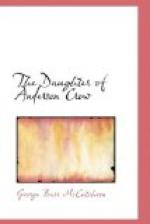That he was from the city, good-looking and well dressed, there was no doubt. He was tall and his face was beardless; that much could be seen at a glance. Somehow, he seemed to be laughing all the time—a fact that was afterward recalled with some surprise and no little horror. At the time, the loungers thought his smile was a merry one, but afterward they stoutly maintained there was downright villainy in the leer. His coat was very dusty, proving that he had driven far and swiftly. Three or four of the loungers followed him into the store. He was standing before the counter over which Mr. Lamson served his soda-water. In one hand he held an envelope and in the other his straw hat. George Ray, more observant than the rest, took note of the fact that it was with the hat that he was fanning himself vigorously.
“A plain vanilla—please rush it along,” commanded the stranger. Mr. Lamson, if possible slower than the town itself, actually showed unmistakable signs of acceleration. Tossing off the soda, the stranger dried his lips with a blue-hemmed white handkerchief. “Is this the post-office?” he asked.
“Yep,” said Mr. Lamson, who was too penurious to waste words.
“Anything here for me?” demanded the newcomer.
“I’ll see,” said the postmaster, and from force of habit began looking through the pile of letters without asking the man’s name. Mr. Lamson knew everybody in the county.
“Nothing here,” taking off his spectacles conclusively.
“I didn’t think there was,” said the other complacently. “Give me a bottle of witch hazel, a package of invisible hair-pins and a box of parlor matches. Quick; I’m in a hurry!”
“Did you say hat-pins?”
“No, sir; I said hair-pins.”
“We haven’t any that ain’t visible. How would safety-pins do?”
“Never mind; give me the bottle and the matches,” said the other, glancing at a very handsome gold watch. “Is the old man still holding my horse?” he called to a citizen near the door. Seven necks stretched simultaneously to accommodate him, and seven voices answered in the affirmative. The stranger calmly opened the box of matches, filled his silver match-safe, and then threw the box back on the counter, an unheard-of piece of profligacy in those parts. “Needn’t mind wrapping up the bottle,” he said.
“Don’t you care for these matches?” asked Mr. Lamson in mild surprise.
“I’ll donate them to the church,” said the other, tossing a coin upon the counter and dashing from the store. The crowd ebbed along behind him. “Gentle as a lamb, isn’t he?” he called to Anderson Crow, who still clutched the bit. “Much obliged, sir; I’ll do as much for you some day. If you’re ever in New York, hunt me up and I’ll see that you have a good time. What road do I take to Crow’s Cliff?”
“Turn to your left here,” said Anderson Crow before he thought. Then he called himself a fool for being so obliging to the fellow.




